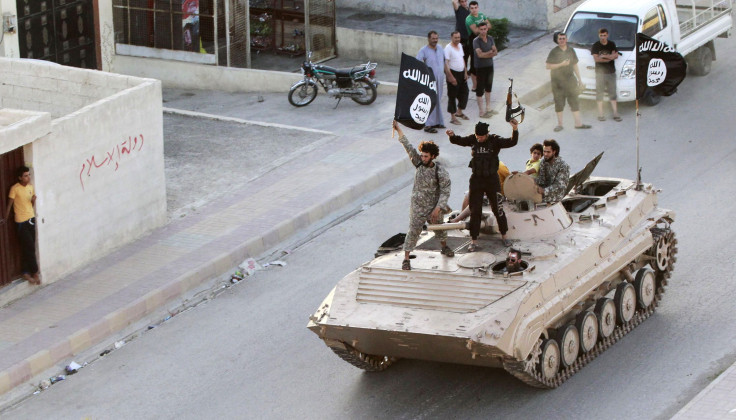Congress Weighing ISIS Response, Funding Attacks

WASHINGTON -- With the beheading of another American by the Islamic State group this week, pressure is building on Congress to take a stand on the U.S. fight against ISIS. President Barack Obama has asked Congress to authorize military action against the militants, and has also asked for $5.6 billion in additional military funding.
But those aren’t easy requests for Congress to meet even though many members, including leadership in both chambers from both parties, largely agree with Obama the U.S. should be fighting ISIS. The last military authorization vote was a decade ago, and casting a ballot to support a war is politically fraught. Hillary Clinton, for example, is still fielding questions about her vote to authorize the Iraq war.
And the $5 billion in funding isn’t just loose change. Conservatives will want to see cuts to other spending areas to offset the new funding while Democrats will adamantly oppose taking the money from domestic programs.
The execution of American aid worker Abdul-Rahman Kassig, also known as Peter, brought fresh attention to the debate, but an authorization vote still seems unlikely for now. At a classified briefing for members of Congress Monday evening, retired Gen. John Allen, who is coordinating the fight against ISIS, didn’t ask for a vote.
“That didn’t come up,” said Rep. Buck McKeon, chairman of the House Armed Services Committee, after the briefing. “There are so many things on leadership’s plate right now." He mentioned the work needed to hammer out budget bills like a continuing resultion or an omnibus spending bill. "There are a lot of things they’re focused on, plus organizing and reorganizing the next Congress,” he said.
McKeon sounded pessimistic about what the United States could do, militarily, to halt the Islamic State group's advances.
“[ISIS is] adding to their ranks faster than we’re able to kill them,” McKeon said. “[The administration] indicated they are making progress, but I think we’re still losing.”
If McKeon isn’t pushing for an authorization vote, the chances Congress will hold one are slim.
When Obama first announced he would move forward with military action against ISIS, he did so using the original congressional approvals for the Iraq war. Many members are happy to let that remain.
Wars take unforeseeable turns and the public can lose faith in the cause. If the fight against ISIS becomes more protracted and costly, legislators don't want to have to explain their support. At the same time, members who vote against it -- either because the authorization isn’t broad enough or because it’s too broad -- might have to sell a nuanced explanation to voters in the future. Those kinds of complexities lead to the political ads that cause nightmares for members of Congress.
Passage of an authorization, often referred to as an AMUF, would require a bipartisan coalition in Congress. And while lawmakers are as appalled as anyone else by the brutality of the Islamic State group, there are Republicans who oppose spending any more money and Democrats who oppose getting involved in another war.
Democrat Rep. Eliot Engel, ranking member of the House Foreign Affairs Committee, is hoping for an authorization vote. Other Democrats also want a vote to take place -- some to be on the record opposing military action.
“I would hope there would be an AMUF vote and I would hope it would come sooner rather than later,” Engle said. “I do think to continue to have policy based on the AMUF of 2001 is specious at best. Even though I support the policy, they need to come to Congress.”
But Reps. John Garamendi, D-Calif., and Alan Grayson, D-Fla., have said they would oppose the president’s efforts to increase troop levels in Syria. “There is no reason for the president to send in more U.S. troops when he hasn't even asked our allies whether they would send in troops,” Grayson told U.S. News and World Report. “The additional troops aren't fighting troops, they're just target practice for ISIS."
“It’s a greased slope,” Garamendi told CNN. “We’ve been there and done that, twice. It has not worked. We better rethink this whole strategy.”
Leaving Obama to fight ISIS with the old authorizations creates its own problems. An authorization can define the mission, with specific parameters and limits to the president’s ability to fight. It can articulate the ultimate goal and specify signposts along the way.
The lack of an explicit and unified commitment makes it more difficult to recruit allies, and may hobble Obama's efforts to persuade other nations to join the fight. Already, Washington's murky position on Syrian President Bashar Assad has left nations like Turkey and France with questions.
But even if Congress lets Obama continue to operate under old authorizations, lawmakers control the checkbook, and wars -- even ones fought from the air with no boots on the ground -- are expensive.
After the midterm election, Obama asked for $5.6 billion in additional funding. So far, Congress hasn’t figured out from where that money should come.
“I’m very inclined to provide [it],” Sen. Lindsey Graham, R-S.C., said. “We need money because these operations are costly and the more robust we become in our engagement, the more it will cost. So the idea of more money makes sense.”
Rep. Markwayne Mullin, R-Okla., leaving the briefing Monday night, wasn’t ready to sign the check.
“Those are details we’re still working through,” Mullin said. “We need to know if there’s a need for it and the president hasn’t drawn that picture for it. Our first responsibility is to make sure we take care of Americans and our citizens here. I don’t know if you can put a price tag on that, but the president needs to draw that picture for us. We need to know how those dollars are being used and if it’s the best use for our country.”
© Copyright IBTimes 2024. All rights reserved.





















